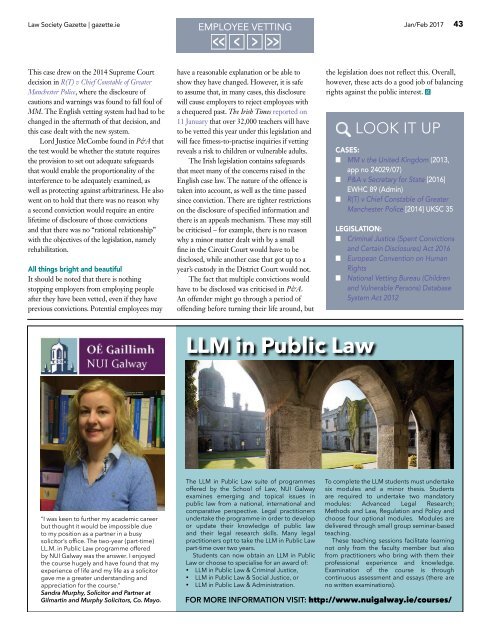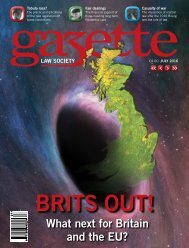ga ette
Jan-Feb-17-Gazette
Jan-Feb-17-Gazette
You also want an ePaper? Increase the reach of your titles
YUMPU automatically turns print PDFs into web optimized ePapers that Google loves.
Law Society Gaz<strong>ette</strong> | <strong>ga</strong>z<strong>ette</strong>.ie Jan/Feb 2017<br />
EMPLOYEE VETTING<br />
43<br />
This case drew on the 2014 Supreme Court<br />
decision in R(T) v Chief Constable of Greater<br />
Manchester Police, where the disclosure of<br />
cautions and warnings was found to fall foul of<br />
MM. The English vetting system had had to be<br />
changed in the aftermath of that decision, and<br />
this case dealt with the new system.<br />
Lord Justice McCombe found in P&A that<br />
the test would be whether the statute requires<br />
the provision to set out adequate safeguards<br />
that would enable the proportionality of the<br />
interference to be adequately examined, as<br />
well as protecting a<strong>ga</strong>inst arbitrariness. He also<br />
went on to hold that there was no reason why<br />
a second conviction would require an entire<br />
lifetime of disclosure of those convictions<br />
and that there was no “rational relationship”<br />
with the objectives of the legislation, namely<br />
rehabilitation.<br />
All things bright and beautiful<br />
It should be noted that there is nothing<br />
stopping employers from employing people<br />
after they have been v<strong>ette</strong>d, even if they have<br />
previous convictions. Potential employees may<br />
have a reasonable explanation or be able to<br />
show they have changed. However, it is safe<br />
to assume that, in many cases, this disclosure<br />
will cause employers to reject employees with<br />
a chequered past. The Irish Times reported on<br />
11 January that over 32,000 teachers will have<br />
to be v<strong>ette</strong>d this year under this legislation and<br />
will face fitness-to-practise inquiries if vetting<br />
reveals a risk to children or vulnerable adults.<br />
The Irish legislation contains safeguards<br />
that meet many of the concerns raised in the<br />
English case law. The nature of the offence is<br />
taken into account, as well as the time passed<br />
since conviction. There are tighter restrictions<br />
on the disclosure of specified information and<br />
there is an appeals mechanism. These may still<br />
be criticised – for example, there is no reason<br />
why a minor matter dealt with by a small<br />
fine in the Circuit Court would have to be<br />
disclosed, while another case that got up to a<br />
year’s custody in the District Court would not.<br />
The fact that multiple convictions would<br />
have to be disclosed was criticised in P&A.<br />
An offender might go through a period of<br />
offending before turning their life around, but<br />
the legislation does not reflect this. Overall,<br />
however, these acts do a good job of balancing<br />
rights a<strong>ga</strong>inst the public interest.<br />
LOOK IT UP<br />
CASES:<br />
n MM v the United Kingdom (2013,<br />
app no 24029/07)<br />
n P&A v Secretary for State [2016]<br />
EWHC 89 (Admin)<br />
n R(T) v Chief Constable of Greater<br />
Manchester Police [2014] UKSC 35<br />
LEGISLATION:<br />
n Criminal Justice (Spent Convictions<br />
and Certain Disclosures) Act 2016<br />
n European Convention on Human<br />
Rights<br />
n National Vetting Bureau (Children<br />
and Vulnerable Persons) Database<br />
System Act 2012<br />
LLM in Public Law<br />
“I was keen to further my academic career<br />
but thought it would be impossible due<br />
to my position as a partner in a busy<br />
solicitor’s office. The two-year (part-time)<br />
LL.M. in Public Law programme offered<br />
by NUI Galway was the answer. I enjoyed<br />
the course hugely and have found that my<br />
experience of life and my life as a solicitor<br />
<strong>ga</strong>ve me a greater understanding and<br />
appreciation for the course.”<br />
Sandra Murphy, Solicitor and Partner at<br />
Gilmartin and Murphy Solicitors, Co. Mayo.<br />
The LLM in Public Law suite of programmes<br />
offered by the School of Law, NUI Galway<br />
examines emerging and topical issues in<br />
public law from a national, international and<br />
comparative perspective. Le<strong>ga</strong>l practitioners<br />
undertake the programme in order to develop<br />
or update their knowledge of public law<br />
and their le<strong>ga</strong>l research skills. Many le<strong>ga</strong>l<br />
practitioners opt to take the LLM in Public Law<br />
part-time over two years.<br />
Students can now obtain an LLM in Public<br />
Law or choose to specialise for an award of:<br />
• LLM in Public Law & Criminal Justice,<br />
• LLM in Public Law & Social Justice, or<br />
• LLM in Public Law & Administration.<br />
To complete the LLM students must undertake<br />
six modules and a minor thesis. Students<br />
are required to undertake two mandatory<br />
modules: Advanced Le<strong>ga</strong>l Research;<br />
Methods and Law, Regulation and Policy and<br />
choose four optional modules. Modules are<br />
delivered through small group seminar-based<br />
teaching.<br />
These teaching sessions facilitate learning<br />
not only from the faculty member but also<br />
from practitioners who bring with them their<br />
professional experience and knowledge.<br />
Examination of the course is through<br />
continuous assessment and essays (there are<br />
no written examinations).<br />
FOR MORE INFORMATION VISIT: http://www.nui<strong>ga</strong>lway.ie/courses/



